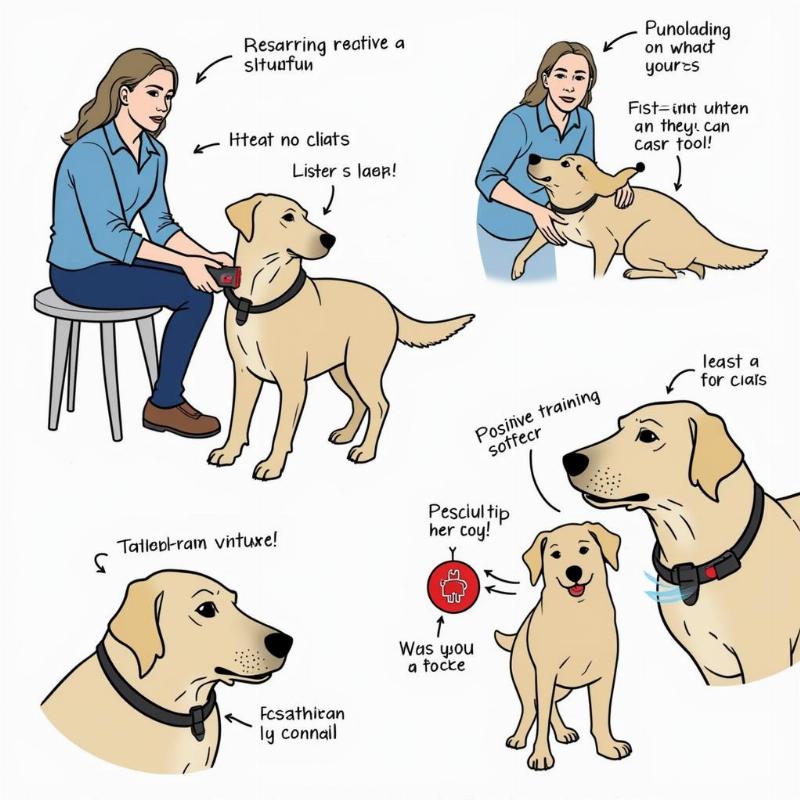Shock collars, also known as e-collars or training collars, are a controversial tool used for dog training, especially for dogs perceived as stubborn. Understanding the implications, proper usage, and alternatives is crucial for responsible pet ownership. This guide will provide you with all the information you need to make informed decisions about using shock collars for your stubborn dog.
Understanding “Stubbornness” in Dogs
Before considering a shock collar, it’s essential to understand why your dog exhibits behaviors labeled as “stubbornness.” Often, what we perceive as stubbornness can be rooted in fear, anxiety, lack of proper socialization, or simply a mismatch between the dog’s breed characteristics and the owner’s expectations. For example, a Basset Hound, bred for tracking, might seem stubborn if forced into agility training. Similarly, a dog with a history of abuse might be hesitant to follow commands due to fear, not stubbornness.
 Shock Collar Training for Stubborn Dogs
Shock Collar Training for Stubborn Dogs
How Shock Collars Work and Their Potential Impact
Shock collars deliver a static correction, ranging from a mild tingling sensation to a more intense shock. The intensity is adjustable, and responsible manufacturers provide clear instructions on usage. However, even at lower levels, the experience can be unpleasant and potentially harmful if misused. Improper use can lead to increased anxiety, fear-based aggression, and a damaged relationship with your dog. Moreover, a shock collar doesn’t address the underlying cause of the behavior.
Alternatives to Shock Collars for Stubborn Dogs
Positive reinforcement methods, focusing on rewarding desired behaviors, are generally more effective and humane than aversive methods like shock collars. These methods include:
- Reward-based training: Using treats, praise, and toys to motivate your dog.
- Clicker training: Pairing a clicker sound with rewards to mark desired behaviors.
- Force-free training: Prioritizing your dog’s comfort and well-being during training.
Are Shock Collars Ever Appropriate?
While positive reinforcement is generally preferred, some professional trainers argue that shock collars can be effective in specific situations, such as:
- Severe behavioral issues: Under the guidance of a certified professional dog trainer, shock collars might be considered as a last resort for addressing extremely challenging behaviors, such as aggression.
- Off-leash training in high-risk environments: For dogs with a strong prey drive, a shock collar can sometimes be a safety measure in uncontrolled environments, but only after exhaustive training with positive reinforcement methods.
Choosing the Right Shock Collar (If Necessary)
If, after consulting with a certified professional dog trainer and veterinarian, you decide to use a shock collar, it’s vital to choose a high-quality, reputable brand that prioritizes safety and provides clear instructions. Look for features like adjustable intensity levels, safety shut-off mechanisms, and waterproof designs. Remember, a shock collar should never be used as a punishment tool. best shock collar for stubborn dogs or best shock collar for large stubborn dogs will offer valuable resources on selecting the best collar.
Conclusion
Addressing “stubbornness” in dogs requires patience, understanding, and a commitment to positive reinforcement techniques. While shock collars might have a place in very specific scenarios, they should never be the first resort. Thorough research, consultation with professionals, and a focus on your dog’s well-being are essential for responsible pet ownership. shock collar for large stubborn dogs can be helpful for specific situations. Exploring alternatives like dog collars that stop barking or dog training collars no shock is often a more humane and effective approach.
FAQ
- Are shock collars cruel? While proponents argue that they can be used safely, many experts believe shock collars can cause pain and anxiety.
- Can shock collars be used on puppies? Generally, shock collars are not recommended for puppies due to their developmental stage.
- What are the long-term effects of using a shock collar? Misuse can lead to increased fear and aggression.
- Are there any legal restrictions on using shock collars? Regulations vary by location. It’s crucial to check your local laws.
- What should I do if my dog doesn’t respond to positive reinforcement? Consult a certified professional dog trainer or veterinarian.
Beautdogs.us is your premier resource for all things dog-related in the USA. We offer expert advice on dog breeds, care, and products, catering to both new and experienced dog owners. Our team of experts is dedicated to providing comprehensive and reliable information to help you navigate the joys and challenges of dog ownership. Contact us today for personalized support! Email: [email protected], Phone: +1 501-555-7529. Visit Beautdogs.us for more valuable insights into the world of canine companionship.